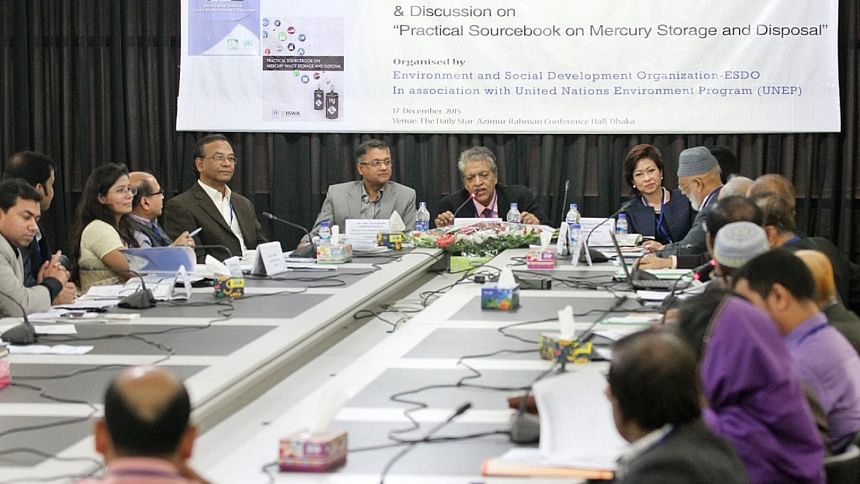Alarming mercury use increasing health risks in Bangladesh

Due to a lack of regulation, the use of mercury reached an alarming level in Bangladesh increasing health risks and environment pollution, said experts at a workshop yesterday.
The speakers emphasised raising awareness about a stop to the use of the harmful liquid metal and its proper management at the event "Reduction of demand of mercury in mercury containing products in Bangladesh."
In 2014, 58 tonnes of mercury was brought illegally in Bangladesh while in the same period the quantity of imported mercury was 3.73 tonnes, according to a survey report prepared by Environment and Social Development Organization (ESDO), which organised the event at The Daily Star Centre in the capital in association with United Nations Environment Program (UNEP).
The report says 1.09- 6.22 tonnes of mercury vapor is emitted annually from dental amalgam. A person breathes in 3 to 17 micrograms of mercury vapor during dental amalgam filling. Annually, this figure ranges from 1,095 grams to 6,205 grams.
Annually, in the jewellery industry approximately 0.85 tonnes of mercury is emitted and through breaking of thermometers and sphygmomanometers 0.69 tonnes and 3.3 tonnes of mercury is released into the environment respectively, the report adds.
According to another study, "Mercury Sources: Products & Hotspot on Bangladesh," by ESDO, published in 2012, 3,361 to 4,653 ppm of mercury has been used in various beauty and skincare products.
Prof Abu Jafar Mahmud, former chairperson, the Department of Chemistry, Dhaka University, said the mercury used in different products entered human body through various ways. "Mercury harms brain and deteriorates hearing, vision and immunity. Pregnant women and children are more prone to mercury poisoning."
Mercury is also used in everyday consumer products like CFL bulb, cement, and chemical fertilisers in Bangladesh, said Dr Shahriar Hossain, UNEP mercury specialist and secretary general of ESDO.
Avoiding use of coal for power generation, and proper management of the waste that emitted mercury can be helpful in making environment free from the harmful metal, he added.
Dr Desiree Raquel Montecillo Narvaez, program officer of Geneva-based UNEP, stressed the Bangladesh government's initiatives to ratify Minamata Convention.
According to the Minamata Convention, which Bangladesh signed in 2013, mercury use in different products has to be banned by 2020.
ESDO Chairperson Syed Marghub Murshed chaired the workshop.
Md Nurul Karim, additional secretary, the Ministry of Environment and Forest, said the government was extremely sincere about stopping the use of mercury.

 For all latest news, follow The Daily Star's Google News channel.
For all latest news, follow The Daily Star's Google News channel. 



Comments